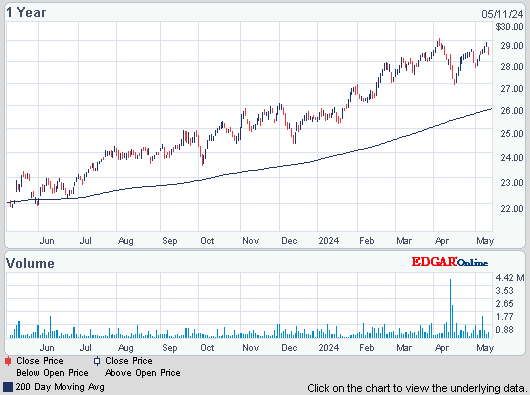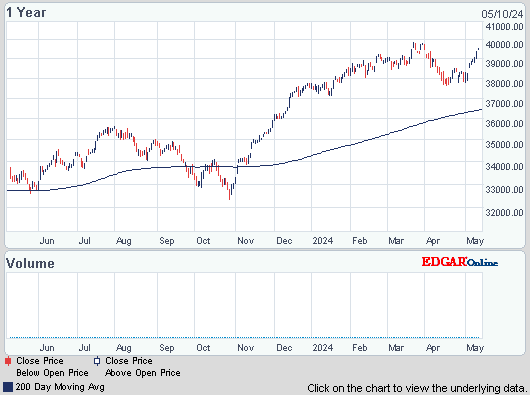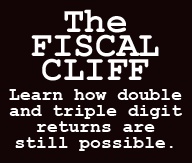Dow slid 21, decliners ahead of advancers 3-2 & NAZ was off 1. The Financial Index gained 1 to 238, a new high since the Lehman collapse. The MLP index rose 1+ to the 427s & the REIT index was up pocket change in the 279s. Junk bond funds edged higher & the Treasury 10-year notes traded in the
narrowest range in more than 2 weeks as the gov
prepared to sell $72B in coupon-bearing notes this
week. Oil continued its march upward to nearly $97 & gold took a nasty spill.
AMJ (Alerian MLP Index tracking fund)

![Live 24 hours gold chart [Kitco Inc.]](http://www.kitco.com/images/live/gold.gif)


Photo: Bloomberg
A Federal Reserve (FED) governor is joining those warning that junk-debt investors are poised for losses, while his institution’s policies spur them to keep buying the debt. Yields on a record 38% of the $1.1T in notes sold by the neediest US borrowers were trading below the 10-year average rate for investment-grade debentures last month according to Barclays data. Investors poured a record $1.3B into US leveraged loan funds last week as covenants on the debt weaken the most in history. The FED policy of keeping benchmark borrowing costs at about zero for a 5th year is pushing investors into riskier debt, even as FED Governor Jeremy Stein warns that the market for speculative-grade debt may be overheating. While federal prosecutors are suing S&P for deliberately failing to provide warnings against losses on collateralized debt obligations before the credit crisis, gov stimulus is fueling demand for similar products now. Sales of so-called covenant-lite loans represented about 55% of the debt sold to non-bank lenders in Jan, the greatest proportion ever, according to Morgan Stanley. Covenant-lite debt does not carry lender protection such as financial maintenance requirements.
Fed Joining in Alarm Over Distortion It Enabled: Credit Markets

Photo: Bloomberg
On the other hand FED Vice Chairman Janet Yellen says the central bank may keep its key short-term interest rate at a record low even after unemployment falls close to a more normal level. The FED has said it would hold its benchmark rate near zero as long as unemployment is above 6.5% & long-run inflation forecasts are below 2.5%. Unemployment is currently 7.9%. In a speech she said those are "thresholds for possible action, not triggers that will necessarily prompt an immediate increase." Her comments echoed remarks Big Ben made in Dec after the FED announced it would change its guidance for future rate increases. He said the FED might decide to keep stimulating the economy even after unemployment falls below 6.5%.
Yellen Says Higher Rates Not Assured After Thresholds Hit
The € rose against the majority of its 16 most-traded peers after ECB council member Jens Weidmann said the currency isn’t seriously overvalued. The currency extended gains against the dollar after Weidmann, who heads Germany’s Bundesbank, warned govs against trying to weaken the €. The currency rose a fraction of a penny to $1.34 after declining to $1.33¼, the lowest since Jan 24. “Latest indicators don’t signal a serious overvaluation of the euro despite its recent appreciation” and “politicians should hold on to the established division of labor,” Weidmann said. “An exchange-rate policy to specifically weaken the euro would lead to higher inflation in the end.” Traders are betting on higher rates for the € which would serve to weaken the economic recovery in Europe. The Group of 7 nations are considering releasing a statement on exchange rates this week to calm concern the world is on the brink of a currency war. The intl finance group is looking to release it before a Feb 15-16 meeting in Moscow from the larger Group of 20.
Euro Advances as ECB Official Says It Isn’t Overvalued
Stocks have been treading water for 2 weeks. During that time Dow has not strayed far from slightly under 14K. It has absorbed all kinds of negative news (budget debate, euro recession, etc.) fairly well. However, bulls have not been able to push it into new record high territory. Automatic federal budget cuts are approaching with no sign of compromise. This week, retail sales data will be reported which will give an idea of how higher Social Security taxes are affecting consumers & the economy. Now the higher € is becoming troublesome for the global economy. The bulls may not be able to juggle all these stories.
Dow Jones Industrials

AMJ (Alerian MLP Index tracking fund)
Treasury yields:
U.S. 3-month |
0.068% | |
U.S. 2-year |
0.252% | |
U.S. 10-year |
1.946% |
| CLH13.NYM | ...Crude Oil Mar 13... | 96.89 | .... | (1.2%) |
![Live 24 hours gold chart [Kitco Inc.]](http://www.kitco.com/images/live/gold.gif)


Photo: Bloomberg
A Federal Reserve (FED) governor is joining those warning that junk-debt investors are poised for losses, while his institution’s policies spur them to keep buying the debt. Yields on a record 38% of the $1.1T in notes sold by the neediest US borrowers were trading below the 10-year average rate for investment-grade debentures last month according to Barclays data. Investors poured a record $1.3B into US leveraged loan funds last week as covenants on the debt weaken the most in history. The FED policy of keeping benchmark borrowing costs at about zero for a 5th year is pushing investors into riskier debt, even as FED Governor Jeremy Stein warns that the market for speculative-grade debt may be overheating. While federal prosecutors are suing S&P for deliberately failing to provide warnings against losses on collateralized debt obligations before the credit crisis, gov stimulus is fueling demand for similar products now. Sales of so-called covenant-lite loans represented about 55% of the debt sold to non-bank lenders in Jan, the greatest proportion ever, according to Morgan Stanley. Covenant-lite debt does not carry lender protection such as financial maintenance requirements.
Fed Joining in Alarm Over Distortion It Enabled: Credit Markets

Photo: Bloomberg
On the other hand FED Vice Chairman Janet Yellen says the central bank may keep its key short-term interest rate at a record low even after unemployment falls close to a more normal level. The FED has said it would hold its benchmark rate near zero as long as unemployment is above 6.5% & long-run inflation forecasts are below 2.5%. Unemployment is currently 7.9%. In a speech she said those are "thresholds for possible action, not triggers that will necessarily prompt an immediate increase." Her comments echoed remarks Big Ben made in Dec after the FED announced it would change its guidance for future rate increases. He said the FED might decide to keep stimulating the economy even after unemployment falls below 6.5%.
Yellen Says Higher Rates Not Assured After Thresholds Hit
The € rose against the majority of its 16 most-traded peers after ECB council member Jens Weidmann said the currency isn’t seriously overvalued. The currency extended gains against the dollar after Weidmann, who heads Germany’s Bundesbank, warned govs against trying to weaken the €. The currency rose a fraction of a penny to $1.34 after declining to $1.33¼, the lowest since Jan 24. “Latest indicators don’t signal a serious overvaluation of the euro despite its recent appreciation” and “politicians should hold on to the established division of labor,” Weidmann said. “An exchange-rate policy to specifically weaken the euro would lead to higher inflation in the end.” Traders are betting on higher rates for the € which would serve to weaken the economic recovery in Europe. The Group of 7 nations are considering releasing a statement on exchange rates this week to calm concern the world is on the brink of a currency war. The intl finance group is looking to release it before a Feb 15-16 meeting in Moscow from the larger Group of 20.
Euro Advances as ECB Official Says It Isn’t Overvalued
Stocks have been treading water for 2 weeks. During that time Dow has not strayed far from slightly under 14K. It has absorbed all kinds of negative news (budget debate, euro recession, etc.) fairly well. However, bulls have not been able to push it into new record high territory. Automatic federal budget cuts are approaching with no sign of compromise. This week, retail sales data will be reported which will give an idea of how higher Social Security taxes are affecting consumers & the economy. Now the higher € is becoming troublesome for the global economy. The bulls may not be able to juggle all these stories.
Dow Jones Industrials








No comments:
Post a Comment